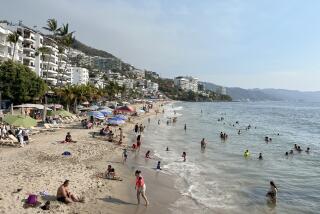Woodward Disclosure Causes a Stir
Bob Woodward’s latest bombshell -- this one about the CIA leak investigation -- touched off a furor in Washington on Wednesday, raising questions about the noted journalist’s previous failure to disclose what he knew, the completeness of the government’s investigation of the case, and the identity of yet another top Bush administration source.
Woodward, an author and assistant managing editor of the Washington Post, disclosed that he had been told by a senior Bush administration official in mid-2003 about CIA operative Valerie Plame, which made him the first journalist known to have been leaked information about Plame, the wife of an administration critic.
Some observers said the disclosure abruptly altered the picture in the criminal case against I. Lewis “Scooter” Libby, the top aide to Vice President Dick Cheney. Libby was named by Special Prosecutor Patrick J. Fitzgerald as having leaked Plame’s identity to other journalists.
“Woodward’s disclosures are a bombshell to Mr. Fitzgerald’s case,” Ted Wells, an attorney for Libby, said in a statement.
Other lawyers familiar with the case downplayed the possible effects of Woodward’s revelation on the prosecution’s case.
But there was rampant speculation about the identity of Woodward’s source. The writer has had unparalleled access to administration officials at the highest levels in researching material for his books and news stories. Some people familiar with the case were shocked that Fitzgerald had not rooted out the conversation earlier.
“It’s just amazing to me,” said a lawyer who represents someone involved in the investigation. “It says to me that you don’t know the whole story yet.”
Woodward disclosed in the Post that Fitzgerald had interviewed him under oath this week after the unnamed official had come forward Nov. 3 and told the prosecutor about the conversations.
In a more-than-two-hour deposition, Woodward said, he told Fitzgerald that the unnamed official had casually told him in mid-June 2003 that Plame worked as a CIA analyst on weapons of mass destruction. Woodward said in an interview that he had not thought that her position was classified. Most analysts at the CIA are not working in a covert capacity, but Plame, a veteran overseas agent, had retained covert status.
It is illegal under certain circumstances to knowingly disclose the identity of a covert operative.
Woodward told Fitzgerald that he also had met with Libby on June 27, 2003, and that he did not think Libby mentioned Plame.
The news was greeted as a godsend Wednesday by Libby’s lawyers. They were in Washington’s federal district courthouse reviewing documents.
Libby has been charged with perjury and obstruction of justice in the case, which started after Plame’s husband, former Ambassador Joseph C. Wilson IV, publicly criticized the Bush administration for allegedly “twisting intelligence” in the run-up to the invasion of Iraq. Wilson had been sent by the CIA to look into reports that Iraq had tried to buy uranium from Niger, and he had found little evidence to support the claims.
Administration officials are believed to have leaked Plame’s name as a way of undermining Wilson’s credibility. Her identity became public in a syndicated column by Robert Novak in July 2003.
Libby’s lawyers jumped on the Woodward disclosure as helpful to their client and hurtful to the prosecution’s case.
“First, the disclosure shows that Mr. Fitzgerald’s statement at his press conference of Oct. 28, 2005, that Mr. Libby was the first government official to tell a reporter about Mr. Wilson’s wife was totally inaccurate,” said a statement released by Wells. “Second, Woodward’s disclosure that he talked to Mr. Libby during this period and that Libby didn’t discuss Plame undermines the prosecution’s claim that Libby was actively seeking to discredit Wilson by leaking information about his wife.”
Dan French, a lawyer representing a witness in the case, said he doubted the revelation would be as explosive as Libby’s lawyers were claiming, because it did not change the facts as to whether Libby lied to investigators about what he had said to whom.
“I don’t think it blows up the case,” French said. “But the [perjury] case is built on claims of memory and lack thereof. The very fact that other reporters are hearing about Plame creates confusion, and allows defense attorneys to raise reasonable doubt” about whether Libby deliberately misled investigators.
Others were more focused on Woodward’s behavior. Woodward apologized to the Post on Wednesday for having failed to tell editors about the conversation until last month, more than two years after it occurred.
“I told him he should have told me about this earlier,” said Executive Editor Leonard Downie Jr. But he added that it was “quite possible we would not have been able to do anything with the information anyway because of the source relationship.”
Nonetheless, Downie said his paper’s most famous writer had violated the “no surprise” rule -- that editors should be told significant information.
Other journalists were more critical of Woodward, whose reporting techniques have come under attack before. He wins access to high-level officials in researching his best-selling books, but draws complaints that there is a conflict between his roles as book writer and reporter.
Former New York Times staffer Sydney H. Schanberg, now a writer for the Village Voice, said Woodward might have become too close to his sources, much like the Nixon apologists in the press corps who termed the Watergate break-in -- the scandal that Woodward helped uncover -- “a third-rate burglary.”
Woodward has discussed the Plame inquiry during some of his frequent appearances on television talk shows, minimizing the seriousness of the investigation and questioning Fitzgerald’s tactics without disclosing his own involvement.
On July 17, he told CNN’s “Reliable Sources”: “I’m not sure there’s any crime in all of this. The special prosecutor has been working 18 months. Eighteen months into Watergate we knew about the tapes. People were in jail. People had pled guilty. In other words, there was a solid evidentiary trail I don’t see here.”
In an interview Wednesday, Woodward said that he would change his tone in those interviews if he had them to do over again. “I think I got a little hyper there,” he said.
He said he meant that “there was no underlying crime” that he knew of. Fitzgerald, he pointed out, didn’t indict on an “underlying crime,” but rather for alleged obstruction of justice and perjury that occurred in the course of his investigation.
Though Woodward did not originally tell his editors about his conversations with the administration official, he told prosecutors that he had told Walter Pincus, another reporter at the paper. However, Pincus says he cannot recall being told this information by Woodward in the summer of 2003, though he did recall talking about it with Woodward later, when he was writing about the administration’s calls to reporters about Plame.
Pincus said Woodward had told him that he too had received information about Plame from an administration official, but he asked Pincus to keep him out of his reporting. Pincus said he assumed Woodward made the request because “he did not want to get subpoenaed.” Pincus said it was easy to agree to Woodward’s request. “I didn’t know who his source was, and if he was not going to tell me there was no place for me to go with the information anyway,” he said.
Pincus and Downie went out of their way to praise Woodward, saying his relationships with top sources were an important asset to the newspaper. Pincus said Woodward had helped him land a story before the U.S. invasion of Iraq that cast doubt on whether Saddam Hussein had weapons of mass destruction.
More to Read
Start your day right
Sign up for Essential California for news, features and recommendations from the L.A. Times and beyond in your inbox six days a week.
You may occasionally receive promotional content from the Los Angeles Times.






